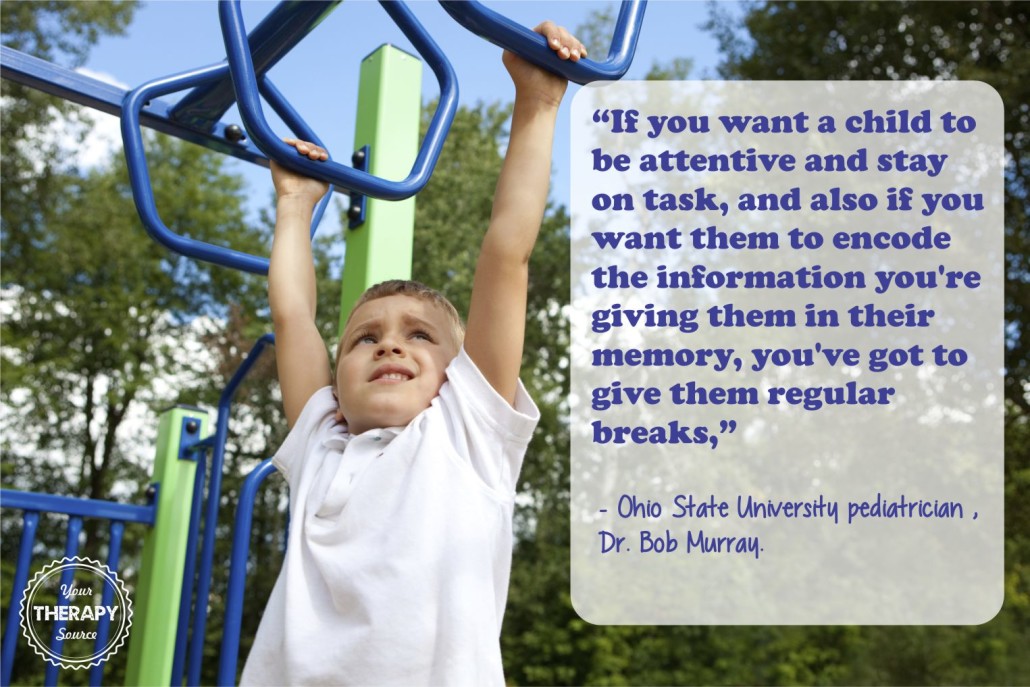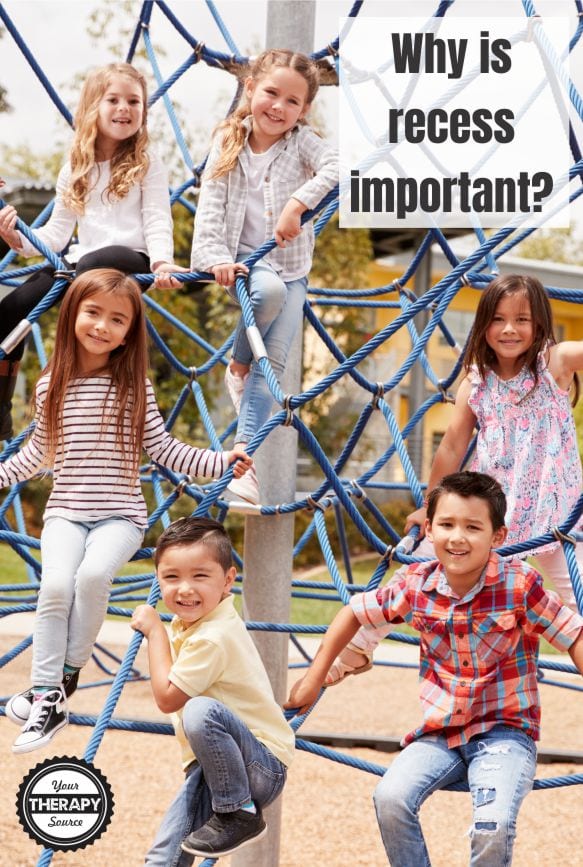Why is Recess Important?

As school based therapists, we are often asked why is recess important? Often times we try to educate school staff on why withholding recess from students can be detrimental. If you want to help students in the classroom? Add recess time!
Evidence indicates that higher levels of physical activity at recess were related to better reading skills. Other evidence supports that children who receive at least 15 minutes of daily recess had better teacher’s rating scores of classroom behavior.
Why is recess important?
It Improves Behaviors and On Task Time
An article on NPR entitled “Turns Out Monkey Bars And Kickball Might Be Good For The Brain” discusses a school in Texas that has increased recess to 15 minutes 4 times per day for kindergartners and first graders. The leader of the changes is a kinesiologist who based the program on Finland schools. Many of the teachers are noticing changes in their students behaviors and ability to stay on task.
Students with Regular Recess Have Stronger Physical and Emotional Health
Dr. Robert Murray previously compiled research for the American Academy of Pediatrics suggesting that kids with regular recess behave better, are physically healthier and exhibit stronger social and emotional development. The policy statement is entitled “The Crucial Role of Recess in School”. The researchers recommend the following:
- “Recess is a necessary break in the day for optimizing a child’s social, emotional, physical, and cognitive development.” Don’t withhold recess from children.
- “Cognitive processing and academic performance depend on regular breaks from concentrated classroom work.” This is true for adolescents and young children.
- ” Recess is a complement to, but not a replacement for, physical education.” Recess allows for unstructured free time whereas physical education class in academically based and structured.
- “Recess can serve as a counterbalance to sedentary time.” Recess time can help children to achieve the recommended 60 minutes of moderate to vigorous activity per day.
- “Recess should be safe and well supervised.” Make sure there is well maintained equipment and safe surfaces to run and play.
- “Peer interactions during recess are a unique complement to the classroom.” If you over hear children during recess you will quickly observe that communication, negotiation and self regulation skills are developed on the playground.
Stuck Indoors? It Is Still Important to Take Breaks
If the weather is bad, students can still benefit from indoor recess and letting their brains take a break. Add in movement for small spaces and you can still sneak in physical activity time. Here are some suggested resources:
Exercises for the Classroom and Home
References:
Barros, Romina M., Silver, Ellen J., Stein, Ruth E. K. School Recess and Group Classroom Behavior Pediatrics 2009 123: 431-436
Connelly, C. Turns Out Monkey Bars And Kickball Might Be Good For The Brain. NPREd. Retrieved from the web on 1/5/16 at http://www.npr.org/sections/ed/2016/01/03/460254858/turns-out-monkey-bars-and-kickball-are-good-for-the-brain.
Medical Express. High levels of physical activity linked to better academic performance in boys. Retrieved from the web on 9/11/14 at http://medicalxpress.com/news/2014-09-high-physical-linked-academic-boys.html#nwlt
Murray, R et al. The Crucial Role of Recess in School. Pediatrics 2013;131;183; originally published online December 31, 2012; COUNCIL ON SCHOOL HEALTH. DOI: 10.1542/peds.2012-2993






Comments are closed.